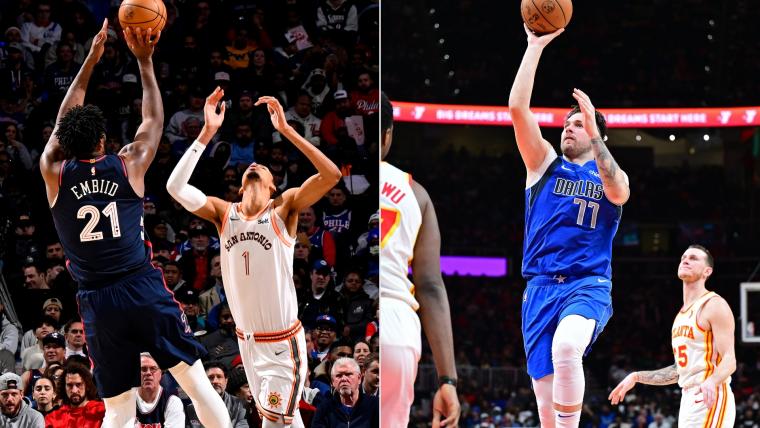In case you've been hiding under a rock, scoring has been skyrocketing in the NBA.
On Friday, Luka Doncic scored 73 points and Devin Booker dropped 62. Four days earlier, Joel Embiid had 70 and Karl-Anthony Towns had 62.
As great as those individual scorers are, the scoring binge is even more evident on a team-wide level. Last year, the Kings created the most efficient offense of all time, recording a 118.6 offensive rating. That record will likely last only one season — the Pacers, Celtics, Bucks, Clippers, Sixers and Thunder are all blowing by that mark.
The phenomenon isn't limited to the elite teams. Michael Jordan's best offensive team came during the 1991-92 championship season when the Bulls averaged 115.5 points per 100 possessions, ranking No. 1 in the league. This season, 17 of the 30 teams in the league are scoring at a better rate.
It's a problem when the Nets, a team that is eight games under .500 and whose two best scorers are Mikal Bridges and Cam Thomas, are outscoring every single Jordan Bulls team.
Here's what can and can't be done to restore balance.
MORE: Breaking down Joel Embiid's simple but unstoppable go-to move
Why is scoring up in the NBA?
One common complaint about the league today is that nobody tries on defense. That's an easy take, but there's not much substance behind it.
Defensive schemes are much more complicated than they were 30 years ago. And the effort required to guard a wider portion of the floor is significantly higher than when defenders were standing around watching a post-up occur for most of the game in the 90s.
Doncic's 73-point masterpiece is a great example. The Hawks were criticized for playing no defense — they have also been bad all season on that end of the floor — but if you watch all of the shots, as NBA analyst Nekias Duncan did, you will see that they used multiple coverages on Doncic. That included dropping, playing at the level of the screen, hedging, switching, blitzing and doubling.
"We tried everything we could from a tactical standpoint," Hawks coach Quin Snyder said the next day. "He is so unique because he makes plays so many different ways."
The Hawks did play mostly solid defense, getting good contests on many of Doncic's shots, but one heavily-cropped transition play went viral, creating a narrative that no defense was played through the entire game. The truth is that they fell victim to an amazing display of skill and did everything that they could within the rules. It still wasn't enough.
MORE: Ranking trade targets for the Lakers, from Zach LaVine to Bruce Brown
What the NBA can learn from European rules
If NBA defenders are playing the best possible defense that is allowed under the current rules and the scoring is still out of control, then there's a logical conclusion that follows — the rules need to be changed.
Doncic himself alluded to this last year in an interview with JJ Redick in which he compared European basketball to the NBA and explained why it is "100 percent" harder to score 30 in a Euroleague game.
Doncic acknowledged that the skill level is much higher in the NBA. The primary reason for higher scoring was rules-related.
"It's very different because the court is smaller. The fouls are different. The rules are different," Doncic explained.
Which rules should be changed? I'm glad you asked.
Get rid of defensive three seconds
The biggest rule difference between the NBA and the Euroleague is a lack of defensive three seconds. That allows big men in Europe to stay in the paint as long as they want, creating a much harder pathway towards scoring layups.
Doncic claimed that by forcing a player like Rudy Gobert to clear out of the paint every three seconds, "you can have 10 more points easily" in the NBA.
Getting rid of the defensive three second rule is a no-brainer. It's not as if it's a sacred rule — it was instituted back in the 2002 season and most leagues don't play with it. It's also difficult to enforce, rarely called at the end of games and limits creativity of tactics because it makes zone defenses more difficult to employ.
Shrink the court
Doncic also claimed that the larger dimensions of the court allow for more spacing and scoring. NBA courts are 94 feet by 50 feet, while Euroleague courts are 91.9 feet by 49.2 feet (28 meters by 15 meters).
A few feet might not seem like much difference, but having less space to guard makes rotations easier and shrinks gaps for players to drive through.
Giannis Antetokounmpo noted the lack of space in the European game at the start of last season.
"Playing with so much less space [in Europe] just helps me figure out things because now, when I go in an NBA game, I just feel like there's so much space for me to operate in and create for my teammates and for myself," Giannis said.
Victor Wembanyama echoed these sentiments after his first Summer League, noting the differences in the NBA game as compared to France.
"The court is more open," Wembanyama said. "Here, players are just flying, out there [in Europe] it's more on the ground, pushing on the ground, big box outs."
MORE: These Victor Wembanyama plays will blow your mind
Allow more contact
The other rule change that the league needs to enforce is to allow defenders to have more contact. Euroleague games allow defenders more control over directing offensive players.
Wembanaya noted that the NBA game is "less physical. I get fouled a lot, but not as much."
That echoed comments by Doncic in which he stated that "the fouls are different" in the NBA.
"Playing in the NBA, you have guys who are almost impossible to guard, and that's why the NBA is way tougher to play."
These rule changes would make it much harder to score, as explained by Nikola Jokic back in 2022.
“Is it harder? Yeah, just because [in Europe], you need to have really quick thinking. In the NBA, if you go by the guy, you can see the help is coming. In Europe, the help is already there.”
If stars like Antetokounmpo, Jokic, Doncic and Wembanyama are all in agreement on how it is more difficult to score for them in Europe, then perhaps we should listen. The answer is overseas — we simply have to look.

